Online Holy Communion:
Theological Reflections Regarding The Internet and The Means of Grace
By: Dr. Gregory S. Neal
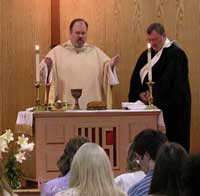
- "Is Virtual Church possible?"
- "Can Christian Community be established via dial-up?"
- "Is it possible to offer the Sacrament of Holy Communion over the Internet?"
I am all for a healthy understanding of the Communion of Saints and the ‘Great Cloud of Witnesses’ but isn't there something lacking in the total absence of a community? Rev. Neal is avoiding the prohibition against “self-service” communion. Rev. Neal appears to have a very individualistic approach to sacraments and worship. There is something crucial to the experience of communion in a community. To eat with others is to require a set of relationships that an individual does not have to consider. As an individual I can sit in front of the TV and watch The Simpsons while eating dinner. But if my family is home it is better for us to sit at the table so that we can learn of each others day, share in the hopes and dreams of life together. Communion is just not an individualistic experience. Even Jesus encourage community - two or more.
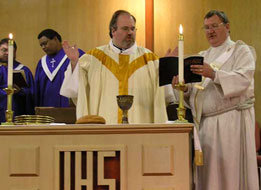
The "complex Padre" is, of course, correct in his observation that Holy Communion should be experienced within community. Indeed, I entirely agree that the Eucharist is most perfectly celebrated within the context of the worshiping Church. As I have clearly stated in sermons and papers that can be found elsewhere on my website, the Sacrament of Holy Communion is a Means of Grace in and through which the believer receives the nourishing, life transforming Real Presence of Jesus. Through faithfully partaking of the Sacrament Christians are brought together within the mystical Body of Christ and are empowered for mission and ministry through our Lord's sanctifying Grace. As such, Holy Communion can never be thought of as an “individualistic” experience, even if one is physically alone when partaking the elements. While perhaps being somewhat unconventional, I certainly do not have a “very individualistic” approach to the Sacraments nor to worship. While one can worship God “by oneself,” as I have done many times during morning and evening prayer, one is never really alone in the worship of God. “Where two or three are gathered together” is, truly, a powerful promise of our Lord’s Real Presence, but it is not in any way a limitation on the ability of Jesus to be present; in other words, there is no physical “quorum” required for Christians to worship or for the Means of Grace to be true and effective in all their marvelous manifestations.
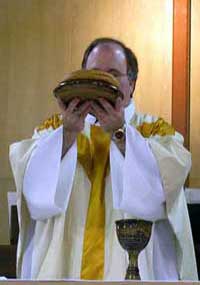
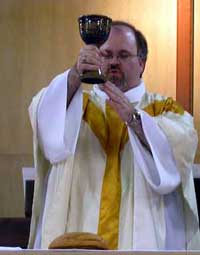
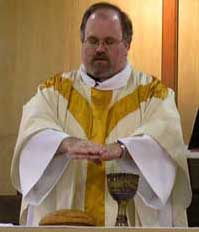
Another impediment to online Holy Communion is the impossibility of transporting the consecrated elements through the internet. Some day it may well be possible to "beam" the bread and the wine through the internet to communicants but as of today this is still beyond our technological capability. Many critics of "Holy Communion on the Web" have focused upon this deficiency, asserting that it seriously -- if not completely -- undermines the ability of the Eucharist to function through the virtual media; and they are correct ... this is a critical issue. Breaking the bread, smelling the wine, and tasting each is both a physiological and typological experience of God's gracious provision; just as the bread and the wine brings nourishment and refreshment, so also Christ Jesus enters our lives to nourish and refresh us. Hence, the elements, as instruments for conveying the Real Presence of Jesus, are central to the Sacrament of Holy Communion.
While most obvious relative to the Sacraments, the centrality of physical instrumentality is true for all of the Means of Grace. Preaching requires voice and hearing and/or the ability to read and write; prayer requires voice (inner or outer); service requires physical action; the reading of Scripture requires the Bible; fellowship requires interaction with others; ordination requires the laying on of hands ... Etc. This characteristic of instrumentality is not something ancillary to the Means of Grace but, rather, is central to each -- the affirmation of catholic Christianity is that God's Grace comes to us through instruments. Indeed, this is the principle difference between the catholic conception of Sacramentology and the Zwinglian conception of Ordinance Theology: in Ordinance Theology God's Grace is understood as falling directly upon the believer, with no mediation between the person and the deity; in Sacramental Theology God's Grace is understood as being conveyed to the believer through many various instrumentalities. Being a United Methodist -- and, hence, Anglican in my Sacramentology -- I affirm the catholic conception of instrumentality: God's Grace is conveyed via means.
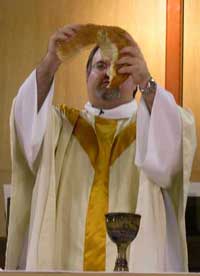
As I have considered this issue the most surprising discovery I have made is that we -- the church -- frequently have what amounts to a "magical" understanding of consecration. Yes, I said "magical" ... for that is how many actually treat the process and the elements which have been consecrated. It's a misunderstanding of the Christian conception of holy consecration, but it is nevertheless one which runs rampant within the thinking and acting of many Christians. For example, in the photo which begins the current section of this article I am pictured consecrating the bread and the cup; my hands are held over the elements as I pray the words:
"Pour out your Holy Spirit on us gathered here, and on these gifts of bread and wine: make them be for us the body and blood of Christ, that we may be for the world the Body of Christ, redeemed by his blood."
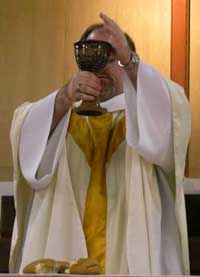
Consecration is not a magic act, nor is it superstition, it is a prayerful liturgical act of the Church in which the celebrant calls upon the Holy Spirit to bless the elements, wherever they are. This is true for the elements localized underneath the celebrant's hands, elements resting elsewhere on the Altar, elements placed at stations around a large congregation, and even elements in Fellowship Halls or auxiliary buildings where an overflow congregation is participating in the worship service via large projection screens. While certainly not conventional, nor even normative, I have become convinced that this also holds true even through radio, television, telephone, live streaming internet transmissions, audio and video recordings, and even on-demand streaming downloads. Human conceptions and limitations of time and space are never an impediment to God's ability or desire to grant divine Grace. Every celebration of the Eucharist which has ever occurred or will ever occur, has taken place at the exact same moment for God ... in God's eternal "now." Likewise, every celebration of the Eucharist, held anywhere in the universe, occurs at the exact same place for God ... in God's omnipresence. Hence, it doesn't matter if the bread and the cup are not in close physical or temporal proximity to the celebrant -- God is present, and God knows the intent and the faith of the communicant, even if they are receiving through the internet and with elements that are on their own side of the connection. If the intent is to receive the Body and Blood of our Lord, and if their faith is focused upon Christ Jesus while partaking, then what we have is certainly a Means of Grace and, I am convinced, a true expression and experience of the Sacrament of Holy Communion.
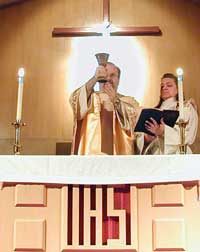
I don't believe that it is wise, or even possible, to confine God within a paradigm of our own creation and assume that such is “all that God must be,” or “the only way that God’s Grace can be received.” Indeed, I believe that we must take great care to not limit the functionality of any of the Means of Grace to just the temporal and physical locality of a church sanctuary or immediate congregation. We don't do this with prayer: although the gathered "prayers of the people" are of great value, we don't deny the efficacy of the prayers of a lone person. We don't do it with the reading of Scripture: while public reading is important, personal reading and study is equally a Means of Grace. Likewise, if preaching is a Means of Grace — and it is — and, yet, through preaching God's Grace can be communicated over the internet, why can't the same be said for Holy Communion? I believe that this is a good question, one that is worthy of serious consideration and not just cursory dismissal. Just because people listen to my audio sermons in the privacy of their homes and on their iPods while working out at the Gym or driving in their cars, this doesn't make them any less a Means of Grace. Likewise, just because a believer is partaking the Sacrament via the internet, this doesn't make it any less a Means of Grace. Perhaps the functionality of the Means is different in kind, process, or even quality, but it is not different in its ontological substance; it is not any less the Grace of God because of the setting in which it is received or the means by which it is conveyed to us. If the this is true for preaching, it's true for the other Means of Grace.
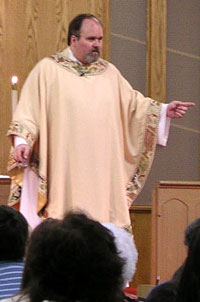
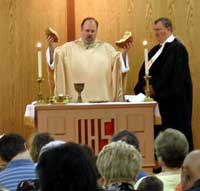
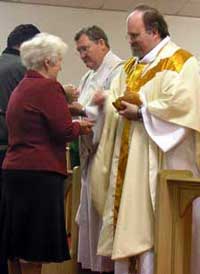
© 2006 Dr. Gregory S. Neal
All Rights Reserved

As a popular teacher, preacher, and retreat leader, Dr. Neal is known for his ability to translate complex theological concepts into common, everyday terms. HIs preaching and teaching ministry is in demand around the world, and much of his work can be found on this website. He is the author of several books, including Grace Upon Grace: Sacramental Theology and the Christian Life, which is in its second edition, and Seeking the Shepherd's Arms: Reflections from the Pastoral Side of Life, a work of devotional literature. Both of these books are currently available from Amazon.com.